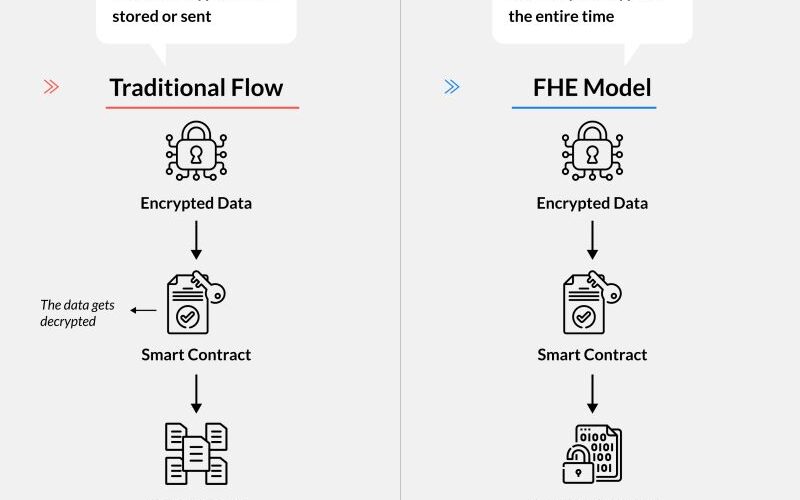Your Data Is Never Fully Encrypted
On blockchains, data can be stored or transferred in encrypted form. But the moment a smart contract needs to compute on it, it has to be decrypted. That short step — decrypt → compute → re-encrypt — is where the risk lies. Sensitive values like salaries, portfolio balances, or medical records are briefly exposed in plaintext.
Enter Fully Homomorphic Encryption (FHE)
This is where Fully Homomorphic Encryption (FHE) changes the model. Instead of decrypting before execution, FHE allows computation to run directly on ciphertext. The contract never sees the raw data, but the computation still produces valid encrypted outputs which means,
-
Private smart contracts → payroll or healthcare dApps that never expose inputs.
-
Confidential DeFi → strategies and portfolio management where balances remain private.
-
Secure DAO voting → members can vote confidentially, while outcomes stay verifiable.
-
Privacy-preserving ML → training or inference on encrypted datasets for fraud detection or medical research.
FHE vs Zero-Knowledge Proofs (ZKPs)
The distinction from Zero-Knowledge Proofs (ZKPs) is important. ZKPs prove correctness of a computation without revealing inputs, but they do not execute on encrypted data. FHE performs the computation itself, and the two approaches can complement each other with FHE handling the execution and ZKPs proving the result’s integrity.
Real-World Progress in FHE
Real-world progress is visible. Zama is building the Concrete library to abstract away FHE’s cryptographic complexity for developers, while Fhenix is applying FHE to encrypted smart contracts and exploring Layer-2 scaling by bundling encrypted transactions. Both are working on the most difficult problems like,
-
Computation overhead → homomorphic operations are still far slower than plaintext operations.
-
Ciphertext size → encrypted data expands significantly, stressing storage and bandwidth.
-
Key management → handling secret keys in a secure and usable way remains a challenge.
-
Interoperability → different FHE schemes exist, but standardization is still in progress.
Why Privacy Matters in Blockchain
As blockchain adoption moves into finance, healthcare, and identity, privacy becomes a baseline requirement rather than an optional feature. Without solutions like FHE, Web3 systems will continue to face barriers in regulated industries. With it, there is a path to compliance-grade confidentiality without sacrificing decentralization.
Open Questions for the Future of FHE
The open questions are big ones:
-
Can FHE overcome its computational cost to be viable for high-throughput chains?
-
How will projects decide between FHE and ZKPs, or use them together?
-
What new DeFi or enterprise models emerge once private computation is truly possible?
These challenges are unresolved, but they are exactly what makes the space worth watching. The answers will shape how privacy-first blockchain applications are built in the coming years.







